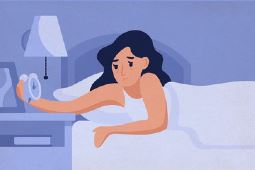
A majority of Americans report sleep problems, and over 50 million Americans meet diagnostic criteria for a sleep disorder. Sleep disorders are associated with many impairments in daytime functioning such as work performance, fatigue, and sleepiness. Sleep aid medications can help in the short-term but are not recommended for long-term use.
Cognitive-behavioral therapies show promise yet can be costly and difficult to access in some regions. Since stress and worry are known to contribute to sleep difficulties, mindfulness training may also aid in resolving problems sleeping.
Huberty et al. [PLOS One] tested the effects of a brief daily use of a mindfulness meditation smartphone app compared to waitlist controls on sleep disturbance symptoms among people reporting elevated insomnia symptoms.
The researchers randomly assigned 263 participants (average age=45 years; 75% female; 57% Caucasian) reporting elevated insomnia symptoms (an Insomnia Severity Index Score >10) to an app-based mindfulness training or a waitlist control. Many of the participants reported having received prior diagnoses such as insomnia (25%), restless leg syndrome (22%), sleep apnea (16%), night terrors (12%) and narcolepsy (5%).
The mindfulness group was assigned to meditate at least 10 minutes daily using the smartphone Calm app over an 8-week period. The Calm app is a commercially available app containing guided meditations derived from Mindfulness-Based Stress Reduction (MBSR) and Vipassana meditation.
Self-report ratings of daytime fatigue, daytime sleepiness, and cognitive and somatic pre-sleep arousal were assessed at baseline, mid-treatment (4 weeks) and post-treatment (8 weeks). Participants in the mindfulness group also kept a daily sleep quality diary for the 8-week period.
The results showed that the mindfulness group spent an average of 15 minutes per day using the Calm app. At post-treatment, the mindfulness group reported significantly greater decreases in fatigue (d=0.23), daytime sleepiness (d=0.30), and cognitive (d=0.33), and somatic pre-sleep arousal (d=0.46) than controls. Mindfulness participants also reported significant improvements in sleep quality (d=0.13) over time, reporting that they fell asleep faster (d=-0.03) and slept longer (d=0.90).
This experimental study shows a mindfulness training app reduces pre-sleep arousal and daytime fatigue and sleepiness in persons reporting sleep difficulties. App users also reported improved sleep quality. These results are important because they show the promise of an easily-accessed, inexpensive, non-intensive mindfulness training people can perform on their own at home.
The study is limited by reliance only on self-report measures and a control group that received no intervention nor completed sleep diaries. It is possible that any app supporting daily wellness and motivating new behavior could lead to similar improvements in sleep.
Reference:
Huberty, J. L., Green, J., Puzia, M. E., Larkey, L., Laird, B., Vranceanu, A.-M., Vlisides-Henry, R., & Irwin, M. R. (2021). Testing a mindfulness meditation mobile app for the treatment of sleep-related symptoms in adults with sleep disturbance: A randomized controlled trial. PLOS ONE, 16(1), e0244717.
Link to article